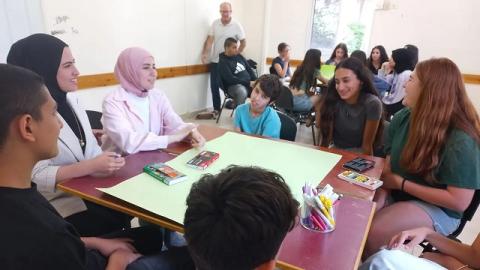Shared society in crisis and hope: education’s role in Israel’s recovery
Givat Haviva’s annual survey earlier this year found 72% of Israeli Jews do not trust the majority of Arab citizens, while 43% of Israeli Arabs do not trust the majority of Jewish citizens.
Yet the foundation for a shared society remains intact. The fact that Israel’s Arab and Jewish citizens recognize they are fated to be together and want to continue finding ways to better Israeli society is reflected in the lack of intercommunal violence since October 7 that exploded during the last Hamas-Israel clash in May 2021.
A recent aChord Center at Hebrew University survey found two-thirds of Jewish and Arab 10th to 12th graders want to improve relations. That’s encouraging in the current situation, as well as in the context of Israel’s educational system. Young Israeli Arabs and Jews have few opportunities for meaningful interaction. They attend separate schools, religious Jews have their own schools, all overseen by different Education Ministry departments.
The urgent need to invest in building trust is evident. Education offers the best approach to return to the well-trodden path of enduring efforts to advance sound Jewish-Arab relations. Further, in our young 77-year-old nation, reinforcing appreciation for shared society among all citizens boosts our respect for democratic values and institutions.
There is a lot of work to do. Israeli governments, regrettably, have not sufficiently promoted the necessity of a shared Jewish-Arab society. Israel’s State Comptroller pointed out four years ago that the government does not invest in educating Israeli children to live in a mixed society. The Education Ministry allocates only two million shekels (about $560,000) annually to shared society education.
How to promote a shared society
Civil society, supported by philanthropy, has assumed the responsibility for developing and implementing effective programs. Givat Haviva, for example, has brought together at our campus in central Israel thousands of Arab and Jewish schoolchildren and adolescents for decades. We also have facilitated Arab educators going to Jewish schools and Jewish instructors to Arab schools.
The number of organizations active in advancing shared living has grown admirably over the years in response to the genuine desire among Jews and Arabs to participate in meaningful, sustainable interactions. The frequency of these efforts was increasing before October 7, even though certain ministers in the current government, installed in December 2022, had already begun, and continue now, to threaten to end the small shared society education budget.
Israel’s government, democratically elected by Jewish and Arab citizens, has a vested interest, indeed a responsibility, to design a comprehensive educational plan that will teach all our children how to live in a shared, prosperous society. Education is key to building trust between Israel’s Jewish majority and Arab minority – not simply by reading textbooks or engaging an occasional guest speaker, but actually sitting down together, partaking in conversations, sharing narratives.
If students have opportunities to learn from Jewish and Arab teachers, if they study each other’s histories and cultures, if they can communicate in both Hebrew and Arabic, that will go a long way toward deepening mutual understanding that is a basis for shared society progress.
The fact that Givat Haviva educational programs resumed very soon after October 7 is indicative of Arab and Jewish citizens’ desires to come together in activities advancing their respective communities and our country. Tragic conflict has not deterred Jewish and Arab citizens, who comprise about 21% of the population, from their dedication to pursuing constructive relationships. The potential to expand shared society education programs is tangible. Communities, Arab and Jewish, are eager to participate.
Education for democracy and equality is challenging normally, even more so in an environment of conflict and polarization. Attaining the promise of equality for all citizens, set forth in Israel’s Declaration of Independence, remains an unfulfilled yet achievable goal.
It is an aspiration championed by American Jews and many in the US Christian community. Their advocacy, based on shared American and Israeli values, is a key element of the American-Israeli partnership. By investing in Jewish-Arab relations projects, Americans help boost shared society efforts that also strengthen Israeli democracy.
When the current war ends, necessary healing in Arab and Jewish societies, rebuilding harmonious ties, will take time. Preserving and expanding what’s been accomplished to strengthen Israeli society for all citizens will require more determination than ever.
Solid investing in majority-minority relations will strengthen our collective appreciation for the values that undergird our precious democracy. That should be an urgent Israeli government priority.
Michal Sella

